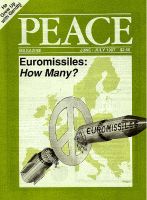
Peace Magazine Jun-Jul 1987, page 14. Some rights reserved.
Search for other articles by Eric Shragge here
UNIVERSITIES ARE NOT NEUTRAL IN the arms race, but are all too open to a partnership with the military. Two forces encourage participation in research that supports the arms race. First, there's a strong demand by both the state and the private sector for research on weaponry. Academics can contract as consultants with the military or with corporations.
Secondly, budget cutbacks and increased competition for government research funds have caused the university to seek alternative sources of funding. Securing outside funding for research is viewed as the sign of academic success. Policies are scorned that might inhibit this process, such as banning weapons-related research.
According to the Department of Supply and Service, research contracts to Canadian universities grew from $8.9 million in 1977/78 to over $30 million in 1981/82, then dropped to $20.5 million by 1982/83. This growth corresponds to the escalation of the arms race.
The issue of military research was raised in the spring of 1984 by McGill Employees for Nuclear Disarmament (MEND). Correspondence with university administrators revealed that all military research was permissible, provided it did not violate the rules on secrecy. Such rules permitted secret research if it was "concerned with the defence of Canada and sponsored by Canadian agencies." Since then, partly due to MEND pressure, secret research is forbidden.
An engineering project by two McGill professors, Knystautas and Lee, known as the Fuel Air Explosive (FAE) study, intensified the debate on military research because fuel-air explosives can be used offensively. These weapons, developed during the Vietnam War for clearing jungles, are formidable anti-personnel weapons producing blast overpressures that cause lethal concussions. The Stockholm International Peace Research Institute classified FAE's as "inhumane and indiscriminate weapons" and tried to have them banned in 1979.
We need to ask: What is military research? Abstract scientific work may be applied to military projects many years after it was originally developed. Hence, a more precise definition of this concept is required. The next step is for universities to ban research funded by military agencies. However, since the military funds research that appears to lack specific military application, several sympathetic members of our group oppose banning all military-funded research. According to the list of DND-funded studies at Canadian universities the research is more often "applied" than "pure" science -- though in the U.S. this may not he the case. To confuse the issue further, there is little restriction on research contracts in the private sector.
Given these complexities, MEND proposed a screening procedure for research funded by military agencies and corporations involved in military production. "Pure science" could proceed, while research having specific military application would he blocked. MEND has begun to use the term "weapons directed research" in an attempt to be more precise.
The argument against interfering with military research is that it violates the practice and rights of academic freedom. However, different standards of research behaviour have emerged. In order to prevent abuse of the privilege of academic freedom and to avoid scandals, constraints on research have been imposed.
For example, research involving either animals or human subjects is regulated and laboratories are subject to inspection. Most research involving human subjects also requires screening by ethics committees to protect the interests of the human subjects. Ironically, most of the research has much less potential to harm a subject than an FAE blast; yet academic freedom is used as an excuse for allowing unregulated military research. Clearly the argument is false. The university should not be a community of individual marketeers, but a place for social responsibility and values that do not yield suffering.
The arms race is not over there somewhere. It is in our institutions, and as new computer and laser technology proliferates, the distance between civilian and military research diminishes. Exposing and publicizing the nature of research makes it less likely that the military will want to be involved where their work can be openly criticized and debated. Those of us in the university community must take the peace movement into our institutions. Advocating for peace studies programs is one way; another is to actively resist the militarization of university research.
Eric Shragge is one of the founders of MEND and a member of its steering committee.

Peace Magazine Jun-Jul 1987, page 14. Some rights reserved.
Search for other articles by Eric Shragge here